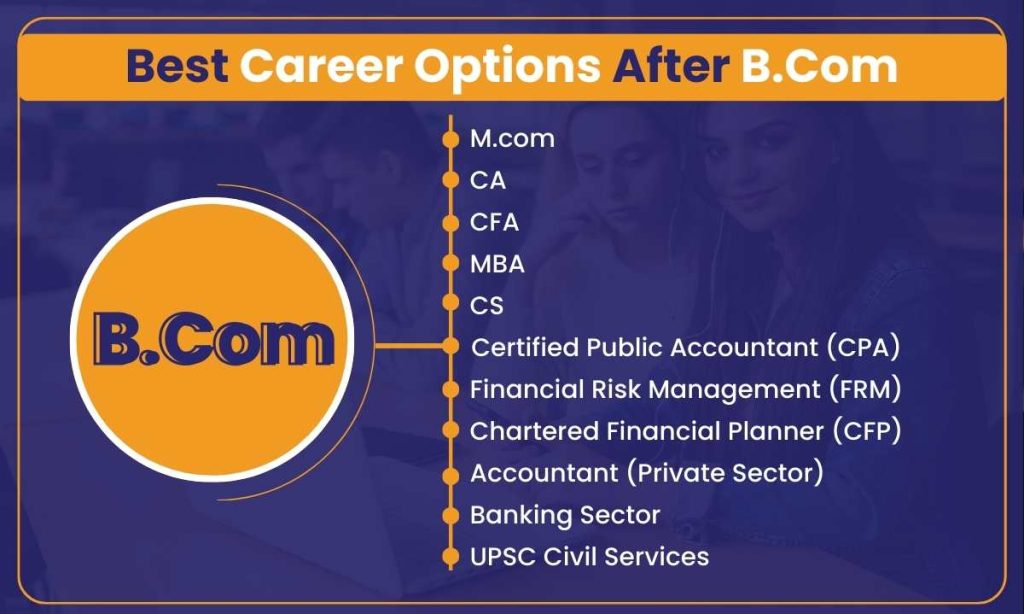Table of Contents
ToggleA typical undergraduate degree with a solid business and commerce foundation is a bachelor of commerce (B.Com). A B.Com degree gives graduates critical finance, accounting, taxes, and business management abilities.
They have many employment possibilities to consider when they enter the workforce. In this post, we will examine 21 of the top career options after B.Com, along with the changes that come with each.
Eligibility Criteria for B.Com
It is essential to comprehend the usual requirements for enrollment in a Bachelor of Commerce degree before delving into the plethora of after B.Com career options. These standards form the basis for admission to B.Com programs at different Indian colleges, as seen in the table below:
| Criteria | Specifics |
| Education | Higher Secondary (10+2) with examination from a recognized board |
| Stream | Commerce |
| Minimum % | Varies, usually falling between 45% and 60% |
| Admission Tests | Some universities may administer exams for admission |
| Required Age | Typically, between 17 and 22 years old |
Although these standards provide a broad picture, potential students must understand that particular prerequisites may vary throughout colleges.
Therefore, to guarantee a smooth application procedure, analyze the admission requirements of the selected institution carefully.
Don't Know Which Career Option Is Best For YOU?
Get in Contact With our Expert Counsellors and Clear all Your Doubts.

12 Best Career Options After B.Com

Bachelor of Commerce degree holders have a wide range of exciting career opportunities. The degree’s broad scope makes it accessible to several industries.
It enables people to customize their professional paths to fit their goals and interests. Let’s examine the 12 best career options after B.Com below.
1. M.Com (Master of Commerce)
A reasonable next step for anybody looking to further their knowledge of business and commerce is to pursue an M.Com. Programs leading to an M.Com provide further study and specialization in marketing, finance, and accounting.
The extra knowledge that graduates possess increases their marketability in the workforce. They can even be eligible for academic posts and higher-level managerial responsibilities.
An M.Com helps people advance professionally by enabling them to explore particular business areas.
2. CA (Chartered Accountant)
For B.Com graduates, being a chartered accountant continues to be one of the most sought-after B.Com career options. Passing the demanding exams and receiving the famous CA degree are requirements.
Chartered accountants are essential to a company’s auditing, taxes, and financial management decision-making processes. Those with a CA certificate are in the vanguard of financial planning and management, whether working for accounting companies or independently.
Read Also: Time Management Habits to Increase Your Daily Productivity
3. CFA (Certified Financial Analyst)
Becoming a Certified Financial Analyst is a well-known option for those interested in financial management. The CFA program provides a thorough grasp of investment analysis, portfolio management, and financial markets.
Completing the program enhances a person’s capacity for analysis and decision-making. It also provides access to positions in financial research, asset management, and investment banking.
Graduates of B.Com programs who hold the CFA qualification are qualified to handle the intricacies of the financial world.
4. MBA (Master of Business Administration)
An MBA is a flexible program for B.Com graduates who want to expand their horizons. Specializations in several areas are available in MBA programs, including operations, marketing, finance, and human resources.
Beyond improving management abilities, an MBA offers a comprehensive grasp of corporate strategy and career after B.Com. After graduation, candidates may work in consultancy or upper management or even start their own business.
Getting an MBA opens doors to business leadership positions.
Read Also: Top 7 Career Options After BBA in 2024
5. CS (Company Secretary)
For B.Com graduates with a strong interest in corporate law and compliance, being a company secretary is an appealing career option.
Professionals in computer science make sure businesses follow laws and regulations. They are essential in board meetings, corporate governance, and legal affairs.
Industry-wide, there is a need for CS specialists, particularly in more prominent organizations where legal nuances and compliance are critical.
6. Certified Public Accountant (CPA)
A Certified Public Accountant (CPA) is an internationally recognized accounting qualification, much like a chartered accountant.
Financial accounting, tax planning, and auditing are the areas in which CPAs excel. This degree benefits people hoping to work with global organizations or international accounting firms.
A CPA qualification can lead to employment opportunities worldwide in accounting, finance, and consulting services.
7. Financial Risk Management (FRM)
If you are fascinated by the intricacies of risk assessment and financial markets, being certified in Financial Risk Management (FRM) is the best career option after B.Com.
Risks in banking, investing, and insurance can be recognized, analyzed, and managed by experts in financial risk management (FRM). Gaining this certification improves risk modeling proficiency.
For financial firms managing an increasingly complicated risk landscape, it makes people valuable assets.
8. Chartered Financial Planner (CFP)
A B.Com graduate can work in the fast-expanding financial planning profession by becoming a Chartered Financial Planner (CFP).
CFP specialists help people and organizations create thorough financial plans. It includes risk management, retirement planning, and investment techniques.
The need for certified financial advisors grows as financial literacy becomes more widely recognized. For B.Com grads, it offers lots of prospects in this industry.
Read Also: 10 Simplest Rules for Guaranteed Success in Your Career
9. Become an Accountant (Private Sector)
For B.Com graduates, choosing typical positions as accountants in the private sector makes sense.
Whether working for a small or large company, accountants are in charge of keeping track of finances, creating statements, and ensuring that taxes are paid on time.
This practical, hands-on position in financial management within a particular industry is perfect for people who like a straightforward approach to their job.
10. Choose Banking Sector
The banking industry provides various prospects and the best career option after B.Com. Corporate banking, investment banking, retail banking, and finance management positions are available.
Graduates can start their careers as associates in banking and work their way up to management roles. They may judge loans, assess risks, and help the bank expand by applying their financial knowledge.
For people who do well in constantly changing and fast-paced industries, banking offers a dynamic atmosphere.
11. Prepare for UPSC Civil Services
It is a respectable alternative for B.Com graduates bent on public service and governance to take the Union Public Service Commission (UPSC) Civil Services examination.
Graduates with a solid background in finance and economics might opt to work for the Indian Revenue Service (IRS) or other related agencies.
These positions entail national economic planning, taxes, and policymaking. It presents a unique chance to support the advancement of the nation.
12. Business Accounting and Taxation (BAT)
Business Accounting and Taxation (BAT) is professional training program which comprises the study of accounting, taxation, auditing, and financial management. It focuses in ensuring that businesses are financially running well and comply with government tax regulations.
It includes a wide range of subjects like tax planning, financial reporting, cost accounting, and corporate finance. Top Careers in Business Accounting and Taxation (BAT) includes opportunities like becoming an accountant, tax consultant, auditor, financial analyst, or tax manager.
Pursuing a career in BAT will give you stable career path with excellent job opportunities and growth potential in various industries.
Choose IIS University for a Successful Career!
Choosing the appropriate college or institution is essential to building a solid foundation while looking for career options after B.Com.
The IIS University stands out among the several possibilities in India for those seeking a Bachelor of Commerce (B.Com) degree. IIS University, well-known for its dedication to academic achievement, offers a thorough B.Com degree that blends theoretical understanding with real-world applications.
The university features a staff of seasoned experts, state-of-the-art facilities, and a strong focus on hands-on learning. This all-encompassing method gives pupils the necessary abilities and information.
It guarantees that students are ready to succeed in their chosen vocations and successfully negotiate the complexity of the commercial world.
FAQs: Career Options After B.Com
1. What can I do after my B Com graduation?
Upon earning your B.Com, you will have a choice of career possibilities. Consider returning to school for an MBA or M.Com or getting a professional certification like CFA or CA.
Alternatively, you can enter the workforce and work in business, finance, banking, or accounting-related positions.
2. Does B.Com have scope?
Indeed. There is a substantial scope after B.Com in accounting, business management, and commerce, and it presents several career options across various sectors. Your employability is improved by the degree that qualifies you for positions in banking, taxation, finance, and the business sector.
3. Is B.Com a good career option?
Yes, a job after getting a B.Com is gratifying. It gives you the tools you need to succeed in business and trade. Owing to its flexibility, the degree may help with a wide range of pursuits, such as graduate work and entry-level jobs in business.
4. Does B.Com have any value?
Of course. Professionally speaking, a B.Com is highly regarded. The B.Com significantly improves your professional possibilities regardless of whether you want to continue schooling or enter the workforce.

“The IIS University Team is a group of expert teachers and staff who are passionate about helping students learn and grow. They come from different fields but all aim to help guide the university’s students. They write these blogs to share their thoughts and ideas about learning and the importance of education. Their goal is to help students prepare for the future in a simple and understandable way.”
